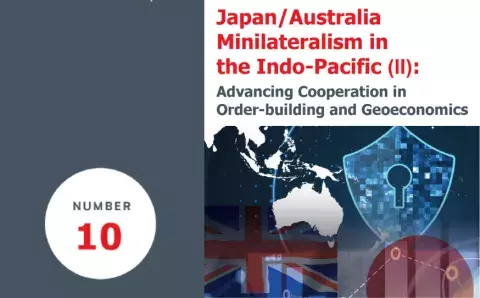

Japan/Australia Minilateralism in the Indo-Pacific Joint Papers
This East-West Center Occasional Paper is the first in a set of two papers examining the ways in which Australia and Japan have sought to leverage minilateral forms of cooperation as a means of strategic competition in the Indo-Pacific. The topic of minilateralism is usually treated as response to the rise of China on the part of “Western” countries, but this obscures the fact that Beijing is also a major practitioner of minilateral forms of cooperation.
Australia/Japan and Chinese Approaches Compared
This paper concludes that Australia and Japan have taken a traditional “security-first” approach to minilateralism. This stands in contrast to the more expansive approach pursued by Beijing, which focuses primarily on geoeconomics along with China’s broader goal of becoming a global leader, which has potential implications for international order. This indicates a significant “mismatch” between the respective vectors along which Australia/Japan and China are pursuing competitive advantage, and underscores how Canberra and Tokyo will need to manage the “security/economic disconnect” in the region, questions to be examined further in the second Occasional Paper that follows.
The views expressed in this publication do not necessarily reflect those of the East-West Center.

Japan/Australia Minilateralism in the Indo-Pacific Joint Papers
This East-West Center Occasional Paper is the first in a set of two papers examining the ways in which Australia and Japan have sought to leverage minilateral forms of cooperation as a means of strategic competition in the Indo-Pacific. The topic of minilateralism is usually treated as response to the rise of China on the part of “Western” countries, but this obscures the fact that Beijing is also a major practitioner of minilateral forms of cooperation.
Australia/Japan and Chinese Approaches Compared
This paper concludes that Australia and Japan have taken a traditional “security-first” approach to minilateralism. This stands in contrast to the more expansive approach pursued by Beijing, which focuses primarily on geoeconomics along with China’s broader goal of becoming a global leader, which has potential implications for international order. This indicates a significant “mismatch” between the respective vectors along which Australia/Japan and China are pursuing competitive advantage, and underscores how Canberra and Tokyo will need to manage the “security/economic disconnect” in the region, questions to be examined further in the second Occasional Paper that follows.
The views expressed in this publication do not necessarily reflect those of the East-West Center.








